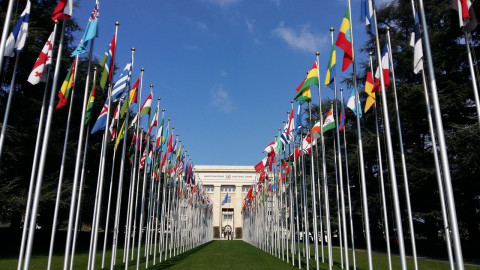The United Nations Inter-Agency Issue-Based Coalition (IBC) on Environment and Climate Change for Europe and Central Asia is an interagency coalition that supports UN Country Teams on environment and climate change in the region. The IBC developed guidance forto strengthening, mainstreaming and integrate integrating environment and climate change within the UN Sustainable Development Cooperation Frameworks (UNSDCFs) and UN Common Country Analysis (CCAs).
Upon the request of Resident Coordinators (RCs) in Europe and Central Asia, the IBC conducted a gap analysis and developed new technical guidance on how to mainstream and integrate environment and climate change in sustainable development processes with the support of the UN’s Development Cooperation Office (DCO). The “Guidance on Integrating the Environment and Climate Change in Processes for United Nations Sustainable Development Cooperation Frameworks(link is external)” is truly an IBC-wide product, as all member agencies participated actively in its development, providing inputs and comments to the drafts.
The Guidance was officially launched on 1 July 2021 with the main goal of supporting the RCs and UNCTs in integrating climate change, environment regulations and assessment in the UN programming cycle. The mainstreaming guidance provides insights on how to increase awareness, assess climate change risks and challenges through internationally used approaches and focuses on opportunities through the identification of good practices. The Guidance is structured in a way that key issues are highlighted and illustrated through specific country cases; the annexes provide examples of different approaches and tools, and illustrate the links among environment, climate change and development priorities.
Prior to drafting the Guidance, a gap analysis was conducted in order to investigate whether UN Common Country Assessments (CCAs) have already integrated environment and climate change and to what extent. The gap analysis found a homogenous coverage of the topic in the 13 CCAs reviewed, and uncovered the need for additional environmental governance guidance, especially in transboundary contexts. Overall, the gap analysis showed that environmental issues are well covered in the monitoring, implementation and evaluation phases of environmental policies, but that the environment is less present as a crosscutting theme when other topics are covered. To address this shortfall, the Guidance recommends that environment and climate change to be treated as a cross-cutting element within non-environmental working groups.
The launch event provided an occasion for IBC members, together with RCs and UNCTs, to discuss and collect ideas on how the IBC can support UN activities at the country level, tailoring this guidance and developing training opportunities that correspond to country needs. During the launch, the IBC discussed with RCs the idea of testing the efficacy of the guidance in specific pilot countries. The Guidance could serve as the entry point for the discussion on environmental and climate change with other coalitions, and boost the collaboration with IBCs in other geographic regions.
According to Ana Luiza M. Thompson-Flores, Director of UNESCO Regional Bureau for Science and Culture in Europe, co-chair of the launch event for “Mainstreaming climate change and environment in Europe and Central Asia: a Technical Guidance”: ‘this Guidance is an excellent example of fruitful collaboration among different UN member agencies and a demonstration of the work of the IBC on Environment and Climate Change: demand-driven, timely and practical.” She added, ”It should be remembered that environmental issues ranging from biodiversity loss, air pollution and climate change are now one of the highest priorities of the UN Agenda considering the scale and severity of their upcoming impacts.”
To determine the way forward for this important output, the webinar participants participated in a survey to assess their opinion on 3 diverse aspects of the guidance use. From the discussion, it emerged that the guidance will be extremely useful, notably in the CCA preparation and that specific trainings are welcomed by the RCs and UNCTs. Participants highlighted the importance that any training or guidance be tailored to subregions. The IBC on Environment and Climate Change is currently working on developing such training materials and modules in fall.
Links:
- UN system in Europe and Central Asia strengthens the integration of the environment and climate change in country-level support
- Promoting measures to green the post-pandemic recovery
- New Issue-based Coalition on Environment and Climate Change in Europe and Central Asia
Documents - Launch of Guidance on Integrating the Environment and Climate Change in Processes for UNSDCFs
URL:


